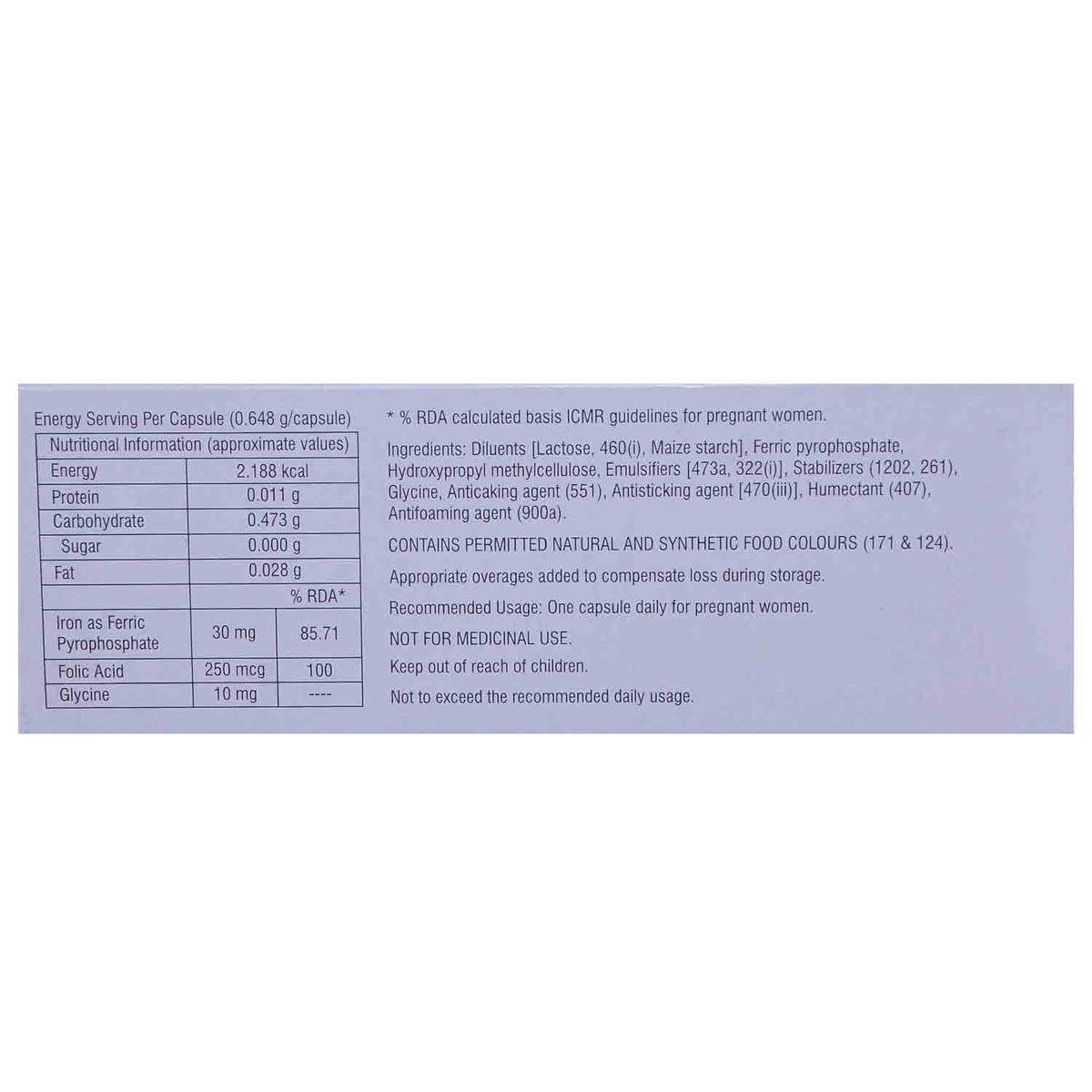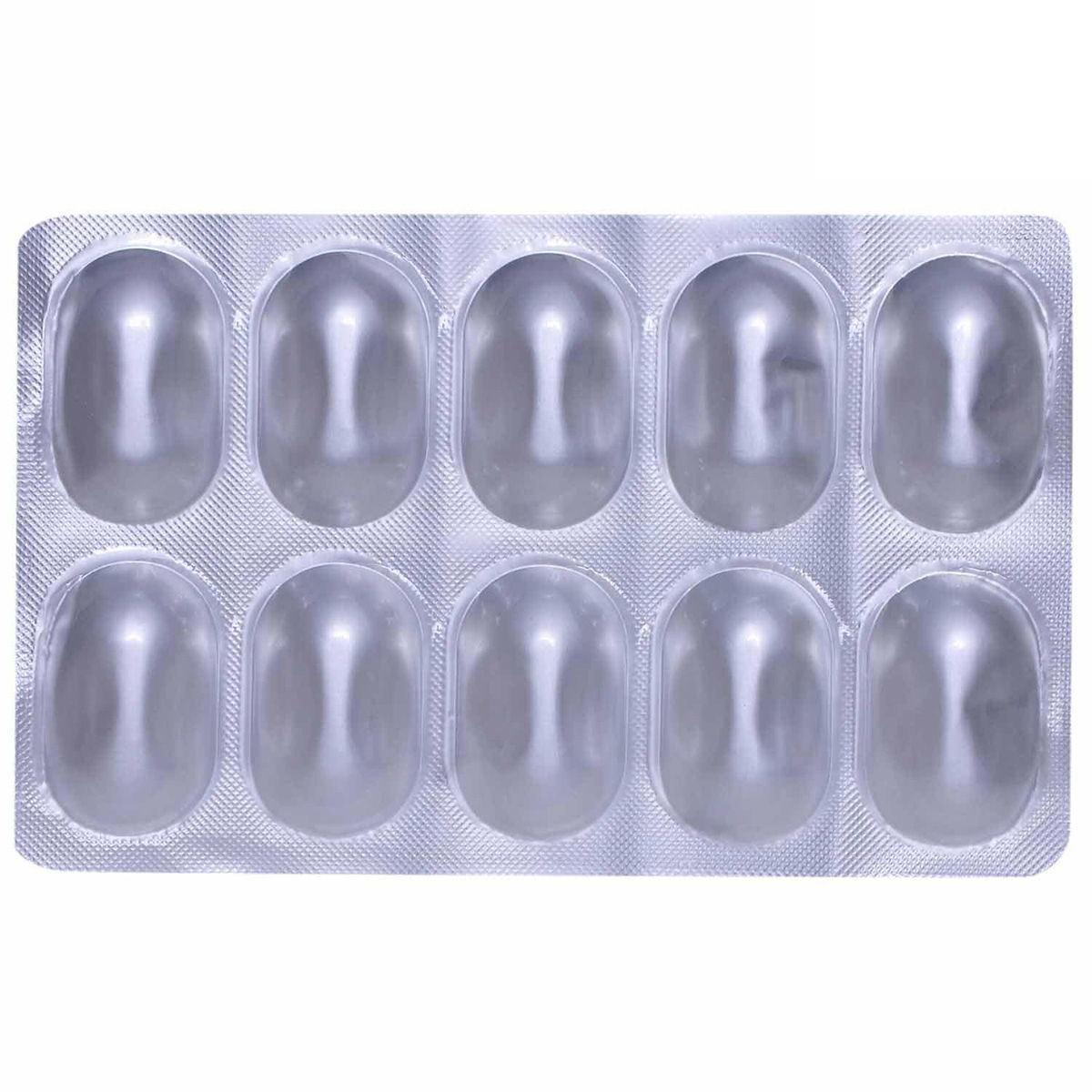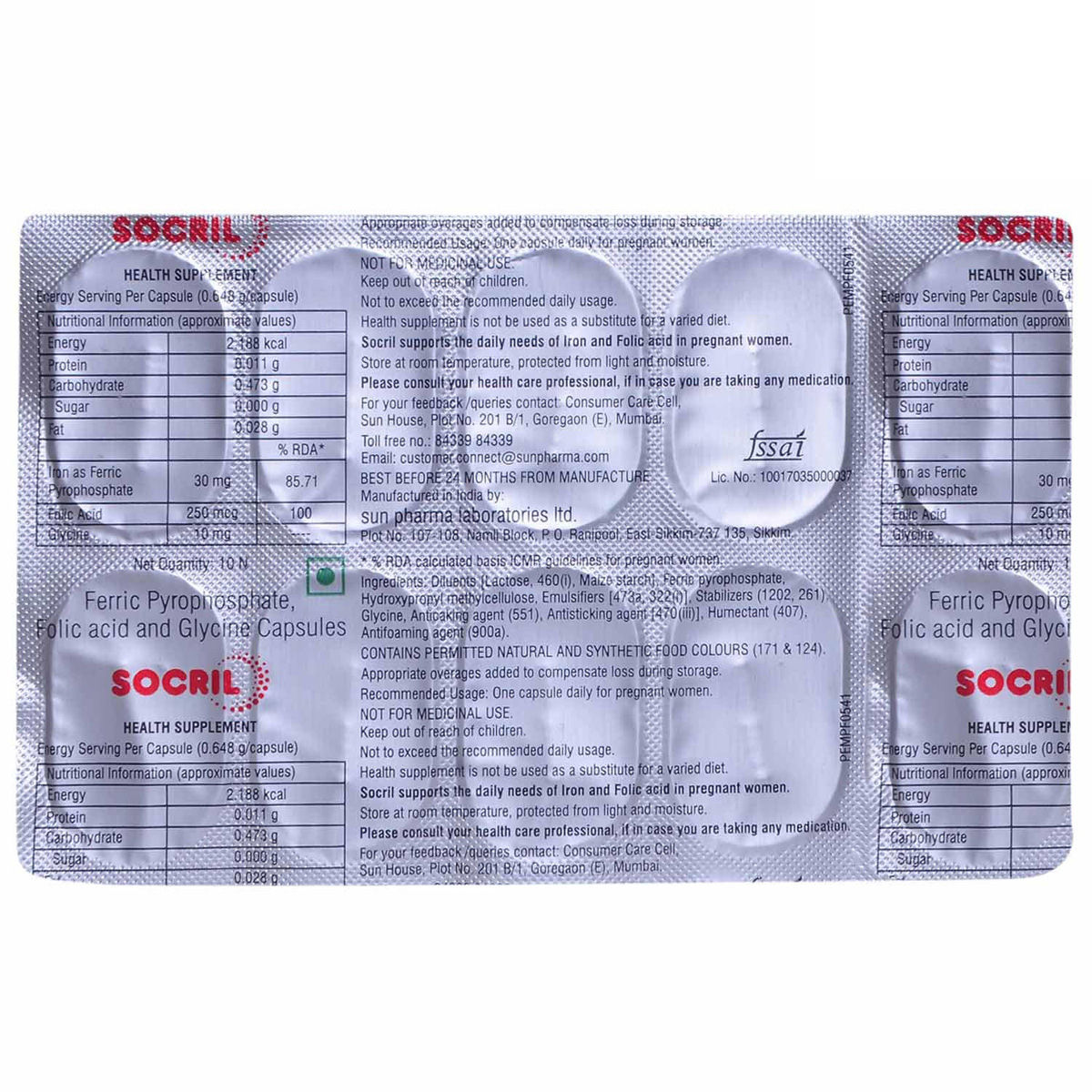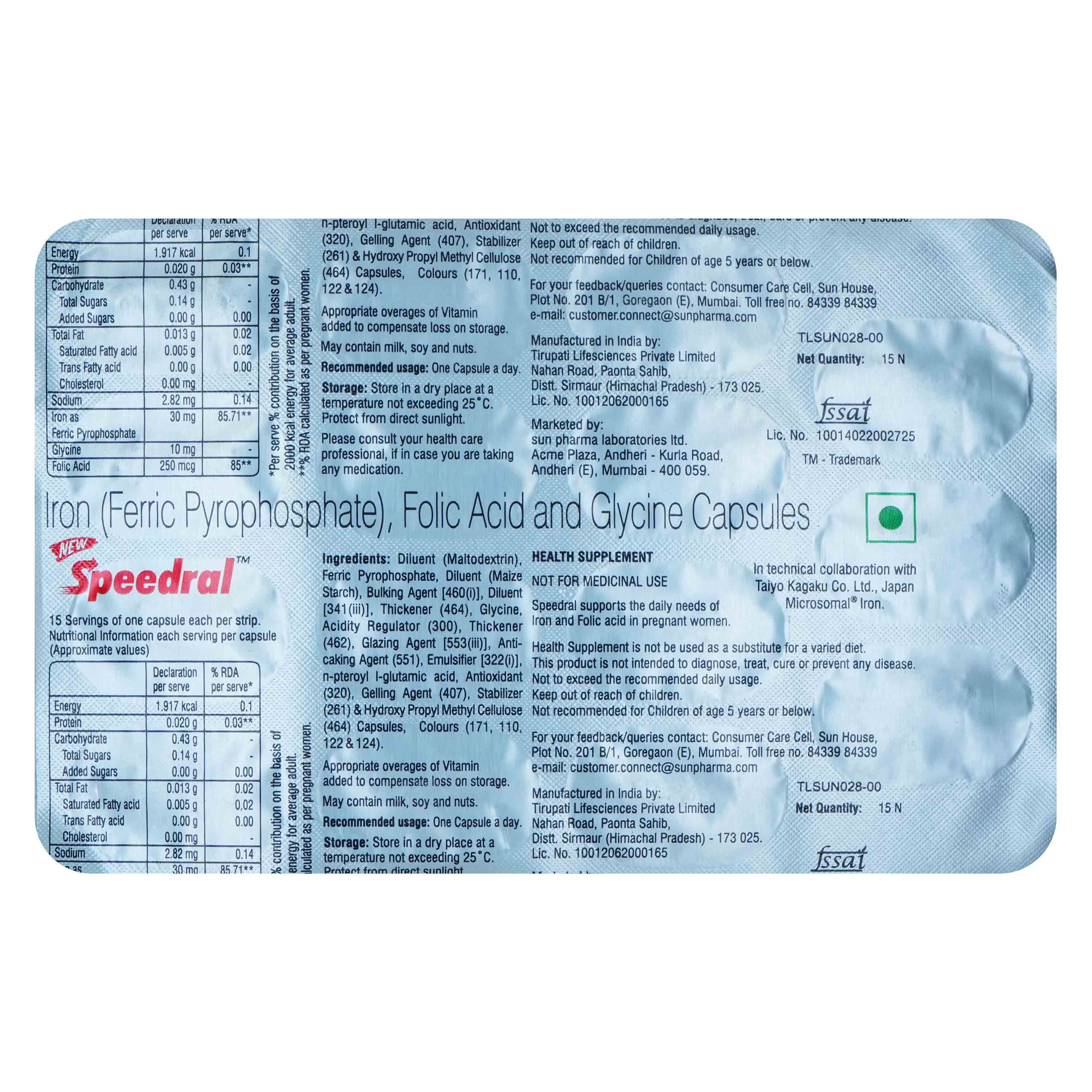सोक्रिल कैप्सूल 10's
Write a Review




₹134.1*
MRP ₹149
10% off
₹126.65*
MRP ₹149
15% CB
₹22.35 cashback(15%)
Free Delivery
With Circle membership
(Inclusive of all Taxes)
This offer price is valid on orders above ₹800. Apply coupon PHARMA10/PHARMA18 (excluding restricted items)
Know Your Delivery Time
Provide Delivery Location
Written By Veda Maddala , M Pharmacy
Reviewed By Santoshini Reddy G , M Pharmacy
Socril Capsule is a combination medicine used in the treatment of iron deficiency anaemia. This medicine works by work by increasing red blood cells (RBC) and haemoglobin (a protein) production in the body. It also synthesises proteins in the body. Common side effects include headaches, nausea, stomach upset or dark-coloured stool.
Available Offers
18% OFF, applicable on orders > INR 2999
10% OFF, applicable on orders > INR 799
20% OFF, applicable on orders > INR 5499

Secure Payment

India's Most Trusted Pharmacy

Genuine Products
Drug-Drug Interactions
Folic acidTrimethoprim
Severe
Folic acidCapecitabine
Severe
Drug-Drug Interactions
Login/Sign Up
Folic acidTrimethoprim
Severe
How does the drug interact with Socril Capsule:
Trimethoprim may decrease the blood levels and effects of Socril Capsule.
How to manage the interaction:
Although there is a possible interaction between Socril Capsule and Trimethoprim, you can take these medicines together if prescribed by your doctor. Do not stop using any medications without consulting your doctor.
Trimethoprim may decrease the blood levels and effects of Socril Capsule.
How to manage the interaction:
Although there is a possible interaction between Socril Capsule and Trimethoprim, you can take these medicines together if prescribed by your doctor. Do not stop using any medications without consulting your doctor.
Folic acidCapecitabine
Severe
How does the drug interact with Socril Capsule:
Co-administration of Socril Capsule with Capecitabine may increase the risk of serious side effects such as bleeding problems, anemia, infections, and nerve damage.
How to manage the interaction:
Although there is a possible interaction between Socril Capsule and Capecitabine, you can use these medicines together if prescribed by the doctor. However, if you experience paleness of skin, diarrhea, severe nausea and vomiting, over-tiredness, dizziness, fainting, blood in the stools, unusual bleeding or bruising, fever, chills, body aches, flu-like symptoms, skin reactions, mouth ulcers or sores, and/or numbness, burning or tingling sensation in the hands and feet, contact a doctor. Do not discontinue the medication without consulting a doctor. Do not discontinue the medication without consulting a doctor.
Co-administration of Socril Capsule with Capecitabine may increase the risk of serious side effects such as bleeding problems, anemia, infections, and nerve damage.
How to manage the interaction:
Although there is a possible interaction between Socril Capsule and Capecitabine, you can use these medicines together if prescribed by the doctor. However, if you experience paleness of skin, diarrhea, severe nausea and vomiting, over-tiredness, dizziness, fainting, blood in the stools, unusual bleeding or bruising, fever, chills, body aches, flu-like symptoms, skin reactions, mouth ulcers or sores, and/or numbness, burning or tingling sensation in the hands and feet, contact a doctor. Do not discontinue the medication without consulting a doctor. Do not discontinue the medication without consulting a doctor.
Folic acidCarbamazepine
Severe
How does the drug interact with Socril Capsule:
Coadministration of Socril Capsule and Carbamazepine may reduce the blood levels of Socril Capsule.
How to manage the interaction:
Although there is a possible interaction between Socril Capsule and Carbamazepine, you can take these medicines together if prescribed by your doctor. However, if your condition changes or you experience loss of seizure control, contact your doctor.
Coadministration of Socril Capsule and Carbamazepine may reduce the blood levels of Socril Capsule.
How to manage the interaction:
Although there is a possible interaction between Socril Capsule and Carbamazepine, you can take these medicines together if prescribed by your doctor. However, if your condition changes or you experience loss of seizure control, contact your doctor.
Folic acidColestyramine
Severe
How does the drug interact with Socril Capsule:
Coadministration of Socril Capsule and Cholestyramine may interfere with the absorption of Socril Capsule.
How to manage the interaction:
Although taking Cholestyramine and Socril Capsule together can result in an interaction, they can be taken together if prescribed by a doctor. However, if you experience Constipation, Diarrhea, Stomach pain, Nausea, or Loss of appetite, consult a doctor. Do not stop using any medications without consulting a doctor.
Coadministration of Socril Capsule and Cholestyramine may interfere with the absorption of Socril Capsule.
How to manage the interaction:
Although taking Cholestyramine and Socril Capsule together can result in an interaction, they can be taken together if prescribed by a doctor. However, if you experience Constipation, Diarrhea, Stomach pain, Nausea, or Loss of appetite, consult a doctor. Do not stop using any medications without consulting a doctor.
Folic acidFluorouracil
Severe
How does the drug interact with Socril Capsule:
Coadministration of Socril Capsule and Fluorouracil may increase the effects of Fluorouracil and increase the risk of serious side effects such as bleeding problems, anaemia (lack of blood), infections, and nerve damage.
How to manage the interaction:
Although there is a possible interaction between Socril Capsule and Fluorouracil, you can take these medicines together if prescribed by your doctor. However, if you experience diarrhoea, paleness of skin, severe nausea and vomiting, over-tiredness, dizziness, fainting, blood in the stools, unusual bleeding or bruising, fever, chills, body pains, flu-like symptoms, skin reactions, mouth ulcers or sores, and/or numbness, burning or tingling in your hands and feet, contact your doctor.
Coadministration of Socril Capsule and Fluorouracil may increase the effects of Fluorouracil and increase the risk of serious side effects such as bleeding problems, anaemia (lack of blood), infections, and nerve damage.
How to manage the interaction:
Although there is a possible interaction between Socril Capsule and Fluorouracil, you can take these medicines together if prescribed by your doctor. However, if you experience diarrhoea, paleness of skin, severe nausea and vomiting, over-tiredness, dizziness, fainting, blood in the stools, unusual bleeding or bruising, fever, chills, body pains, flu-like symptoms, skin reactions, mouth ulcers or sores, and/or numbness, burning or tingling in your hands and feet, contact your doctor.
Folic acidFluorouracil
Severe
How does the drug interact with Socril Capsule:
Co-administration of Socril Capsule with Fluorouracil may increase the risk of side effects.
How to manage the interaction:
Although there is a possible interaction between Socril Capsule and Fluorouracil, you can take these medicines together if prescribed by a doctor. Do not discontinue any medications without consulting a doctor.
Co-administration of Socril Capsule with Fluorouracil may increase the risk of side effects.
How to manage the interaction:
Although there is a possible interaction between Socril Capsule and Fluorouracil, you can take these medicines together if prescribed by a doctor. Do not discontinue any medications without consulting a doctor.
Folic acidSulfadiazine
Severe
How does the drug interact with Socril Capsule:
Sulfadiazine may decrease the blood levels and effects of Socril Capsule.
How to manage the interaction:
Although there is a possible interaction between Socril Capsule and Sulfadiazine, you can take these medicines together if prescribed by your doctor.
Sulfadiazine may decrease the blood levels and effects of Socril Capsule.
How to manage the interaction:
Although there is a possible interaction between Socril Capsule and Sulfadiazine, you can take these medicines together if prescribed by your doctor.
Drug-Food Interactions
No Drug - Food interactions found in our database. Some may be unknown. Consult your doctor for what to avoid during medication.
Drug-Food Interactions
Login/Sign Up
Socril Capsule Substitute

Speedral New Capsule 15's
by Others
₹17.00per tabletOvahb Tablet 10's
by Others
₹14.00per tablet
Product Substitutes
FAQs
Disclaimer
While we strive to provide complete, accurate, and expert-reviewed content on our 'Platform', we make no warranties or representations and disclaim all responsibility and liability for the completeness, accuracy, or reliability of the aforementioned content. The content on our platform is for informative purposes only, and may not cover all clinical/non-clinical aspects. Reliance on any information and subsequent action or inaction is solely at the user's risk, and we do not assume any responsibility for the same. The content on the Platform should not be considered or used as a substitute for professional and qualified medical advice. Please consult your doctor for any query pertaining to medicines, tests and/or diseases, as we support, and do not replace the doctor-patient relationship.
Author Details
We provide you with authentic, trustworthy and relevant information
Buy Now
Add to Cart

















